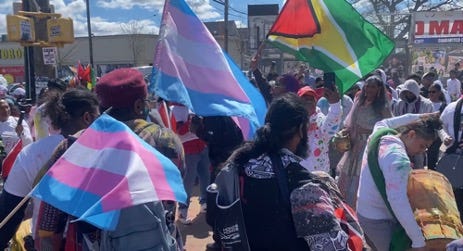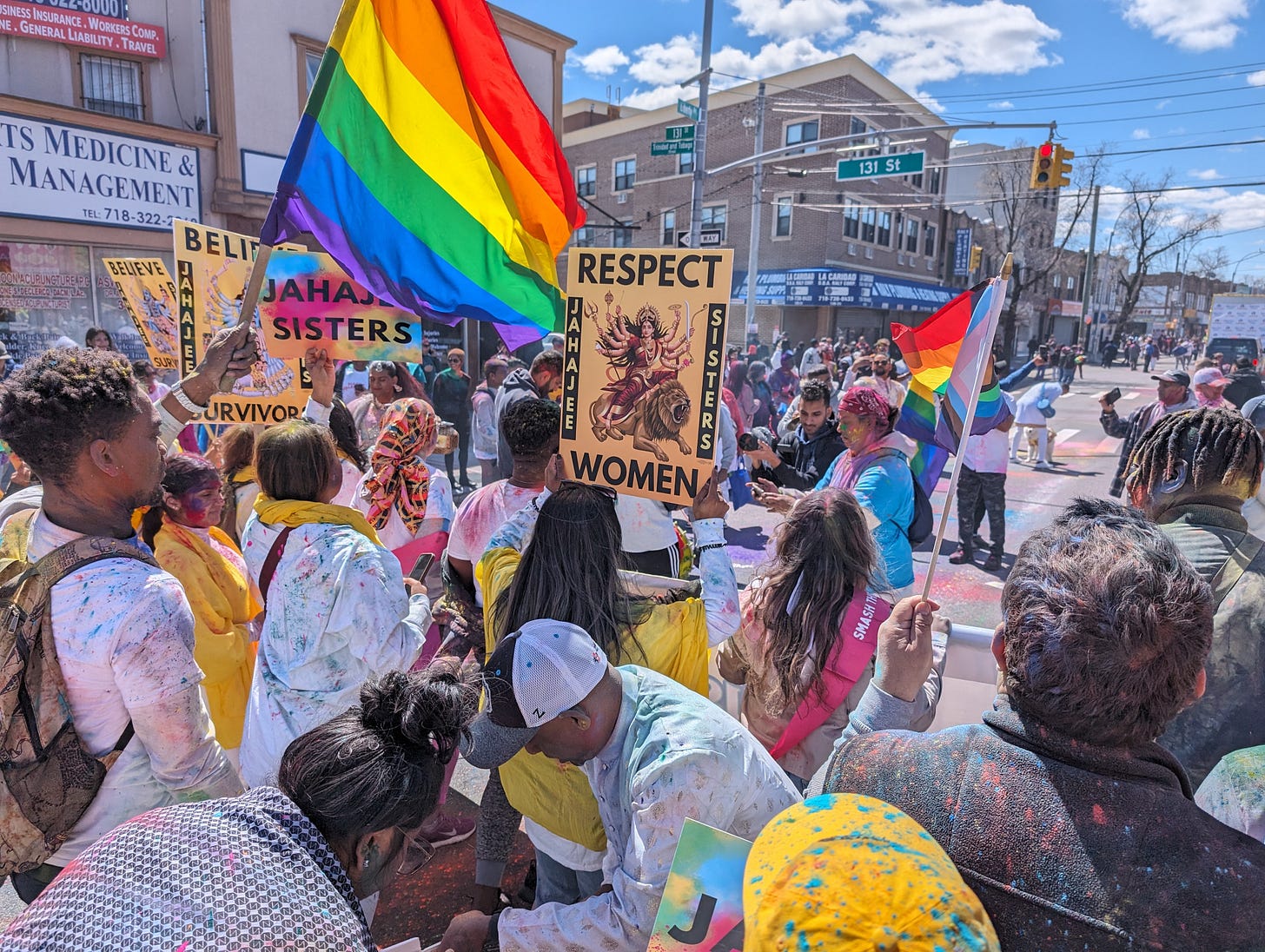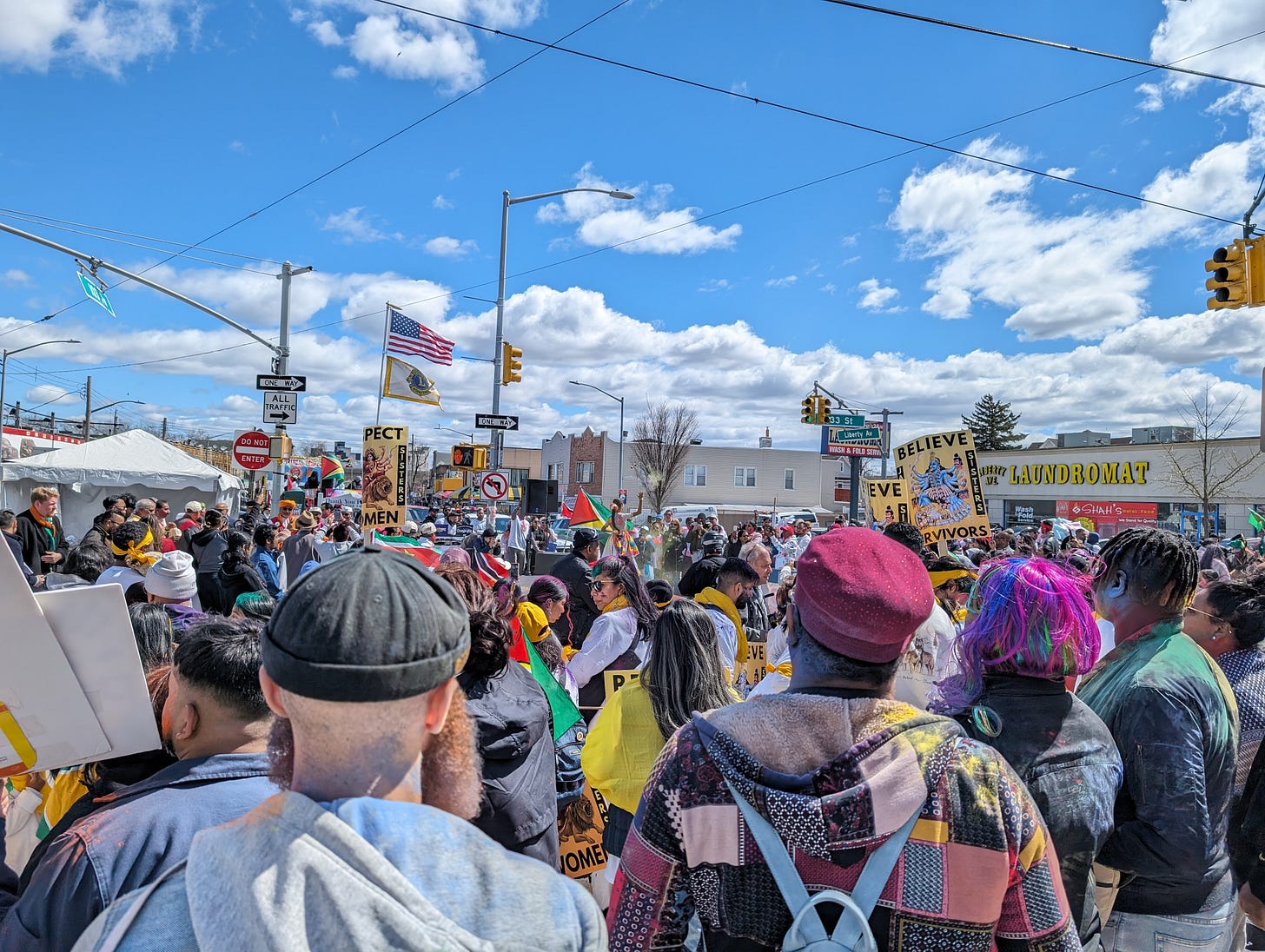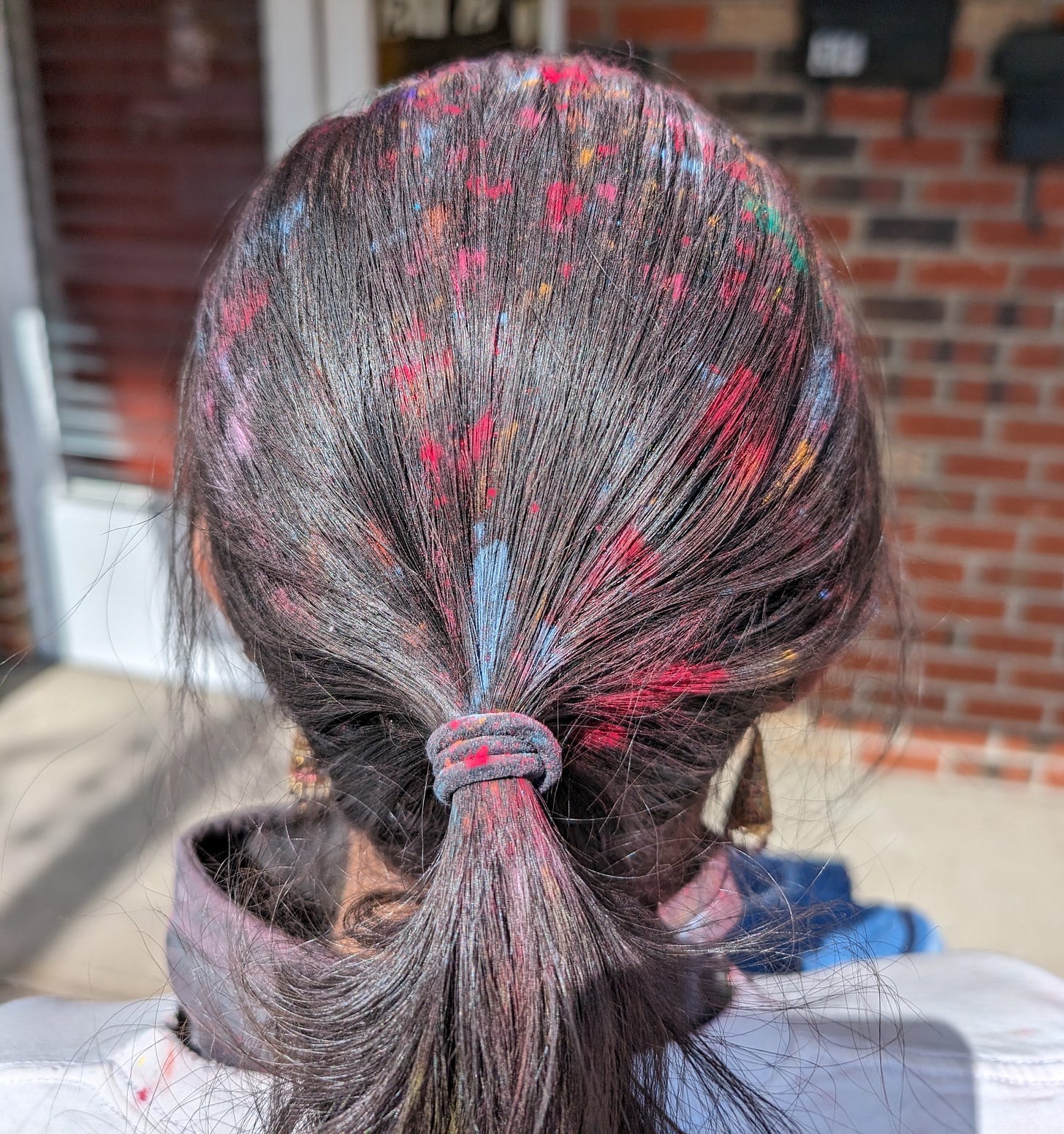Phagwah, Holi, and caste in diaspora - making sense of history and social realities
I started writing about an Indian celebration and whaddya know, I ended up writing about caste.
A few weekends ago, I got to spend Sunday afternoon outside celebrating Phagwah during a neighborhood parade. This holiday is celebrated in many different ways within South Asia and within the diverse diaspora. I’m most familiar with celebrations from the American west coast Indian diaspora, where playing with powdered colors is a joyous and culturally affirming celebration of the arrival of spring. While Indo-Caribbean communities call this holiday “Phagwah,” (from the Bhojpuri language), my Marathi Indian family calls it “Holi”. It is also described originally as a Hindu holiday, but people from many faiths celebrate this cultural event especially in the diaspora.

Phagwah/Holi is typically celebrated at the end of winter, on the last full moon of the Hindu lunar calendar. The date usually falls in March, sometimes late February. Most of the South Asian continent is near the equator, which means the temperature is usually warm enough to be outside. But in North America, it is waaay too cold to be outside for an extended time; especially when I’m using my bare hands to throw powdered color on everyone. When I lived on the west coast of the U.S., it wasn’t a big deal – we could just throw a jacket on and be fine. But now I live in the northeast, and I don’t want to be outside without a down coat and gloves until April. Luckily, the organizers of the Phagwah parade I attended recognize this – they’ve pushed the celebration back to April to make the experience more enjoyable for everyone. A diasporic adjustment I’m very grateful for (and let’s not forget to thank the fossil fuel industries for climate change and warmer spring days…)
Beyond the celebration of spring, some communities celebrate Holi through evoking the playful nature of the relationship between god Krishna and his muse/lover Radha. The story goes that Krishna, a dark-skinned boy, marks Radha’s face with color to have her skin match his skin. Others celebrate Holi for their impending harvest and pray for the fertility of their agricultural lands. For Sikhs, Holi, which happens at a similar time as a separate Sikh festival “Hola Mohalla,” signifies spiritual reconnection where the playing of color represents Sikhs coloring their heart and inner self in spiritual values.
In the last few years, I’ve learned that certain celebrations of this holiday – especially celebrations in India – may have casteist undertones. For those who aren’t familiar with caste in the South Asian context, casteism is the arbitrary ranking of humans – with Brahmins as the most privileged and Dailts as the most oppressed – that has insidiously structured South Asian cultures to benefit privileged groups for thousands of years. There are a few similarities to race in Western contexts - a concept that’s existed for ~500 years - including judgements based on skin color, cultural practices, and false ideas of purity. Dr. Balmurli Natrajan (2020) offers a quick yet thorough background on what caste is, how it shows up, and what it means to contribute to anti-caste movements. Anti-caste movements have existed for hundreds of years too, something I’ll discuss later.
The Holi celebration in question includes or is preceded by an event called Holika Dahan. I’ve never attended one myself, but I’ve read that usually a big fire is built to celebrate “victory of good over evil”. The most popular story associated with this fire centers on the burning of a woman named Holika, who is believed to be a Dailt or Adivasi woman (though some sources deny evidence of this). Holika was either protecting her young Vishnu-loving nephew from his father’s ignorance and rage, or she was trying to kill him on his father’s behalf and the winds changed to kill her instead. Either way, Holi is supposedly played with the powdered ashes of this fire.
Of course, any celebration of burning a woman is immediately suspect (uh, hello patriarchy) as are celebrations of good over evil (who is defining the “evil” or “good”? Likely those who dictate this history), but even more so when casteism is called into question. The celebrations of Phagwah/Holi I’ve been part of in American diaspora have always been culturally affirming celebrations, but the origin stories are not usually dwelled upon. Now I can see those celebrations were often decontextualized by our elders who didn’t have the capacity or skill to talk about caste constructively and/or thought we didn’t need to talk about caste in diaspora (want to note that most South Asian communities I grew up were wealthy, Hindu-dominant and did not consciously include people of Dalit or Shudra castes). I didn’t realize until a few years ago that the name of the holiday I used most, “Holi,” could be a derivation of Holika’s name (but sources also say “Holi” references the Sanskrit word hora which is an ancient name for this festival; or the Sanskrit word sol which means bitter or sour and solika which means cold). Even if we celebrate the holiday without a fire, the name still resonates each time I celebrate. I’m now left with the question: is the celebration of Holi in general a casteist activity? My family tells me our family caste is Maratha (which is within the kshatriya caste, one of several general groupings with caste-privilege). When people from privileged castes celebrate this seasonal holiday without acknowledging casteist histories and current realities – does the celebration of the holiday itself perpetuate casteism?
A loosely comparable American holiday could be Thanksgiving. Even if we celebrated Thanksgiving without all the pioneer settler pride attached to it, would it still be weird if we didn’t mention that this holiday celebrates what became a genocide of Indigenous peoples of Turtle Island? Yeah – definitely. To be honest, the holiday is always weird when I celebrate it with my family since they don’t spend much time thinking or talking about settler colonialism, Indigenous histories, or sovereignty in the U.S. But – when I’m able to celebrate Thanksgiving with friends and chosen family, whose values align closely with mine, the celebration feels collective, generative, and less weird. We’re all on the same page that colonialism and imperialism – inspired by patriarchy and supremacy of certain beings – have and continue to disrupt cultural and environmental relationships, and violently dehumanize people. We work to act on the knowledge that any ranking of humans is unacceptable.
Coming back to the original question – do uncritical celebrations of Phagwah/Holi perpetuate casteism? Short answer: yes – most likely. Longer answer: this shit is really confusing. Even more so than what I’ve already done above (thanks reader for sticking with me).
We know that casteism is still alive in South Asia, and the way it shows up can be regionally and community specific. For example, anti-caste organizing efforts in my paternal side’s village in India helped decrease the impact of casteism locally, but my maternal cousins in a small town were manipulated by family in ugly ways against marriage proposals because of subtle caste differences between the pair. Violence within and across caste also occurs, which can lead to reactionary consequences that don’t help movements to abolish caste either. People often point to the constitution of India (written by the most famous anti-caste activist Dr. Ambedkar who was also Dalit) as an anti-caste document with affirmative action policies for caste-oppressed groups. But legal systems don’t always have the power to solve deep (thousands-year-old!) cultural biases, especially within highly personal marital choices in collectivist cultures. Casteism also still exists within the U.S. diaspora in subtle ways that influence social dynamics and belonging (Equality Labs 2018; Carnegie Endowment for International Peace 2021). One study shows that about half of Indian-Americans identify with a caste and that 80% of those that identify with a caste are from privileged-castes (Carnegie Endowment for International Peace 2021). Meaning that caste is very much an active identity for many South Asians thousands of miles away from the homeland, and mainly for those that are caste-privileged.
Growing up, my family was not consciously in relationship with Dalit or Shudra families in the U.S. I say consciously because if we happened to be, those families were under no incentive to advertise their caste identity. I remember aunties and uncles would ask for new families’ last names – an indicator of caste – or wrinkle their noses in disapproval if someone brought a non-vegetarian dish to a gathering (my family was non-veg, so I noticed). A meat eater is an indicator of a non-Brahmin.
One way these casteist practices of social exclusion can be perpetuated by well-meaning people in the diaspora is by ignoring, denying, or choosing to not investigate how casteism could exist within our cultural practices and celebrations. In the same way some white folk in the U.S. don’t want to talk about race/racism and rather be “color-blind”, those with caste privilege don’t want to talk about caste/casteism and believe that it is only a relic of the past. The privileged aren’t incentivized or don’t have practice in seeing it or acting on it in its current form. And of course when caste interacts with European inspired white supremacist systems in the U.S., it gets even more confusing.
So what do we do? Especially when these uncritical celebrations of Holi within diaspora communities can be triggering and violating to caste-oppressed friends and relatives. One choice is to not celebrate the holiday at all. Many activists/organizers in solidarity with Dalit communities have done this. But I get frustrated with this option because it leaves a gap for casteist, overt or subtle, interpretations to continue as opposed to providing a values aligned alternative and starting another narrative. I wonder if another way is to use the celebrations and associated gatherings to uplift caste-awareness within our communities and recommit to anti-caste values and action (which is I guess what I’m trying to do by processing my thoughts in this post).

That weekend in April, I marched with the Phagwah Social Justice Collective, which included at least seven South Asian and/or Indo-Caribbean organizations working for liberation and power building of women, survivors, working-class immigrants, and trans and queer people of the incredibly diverse South Asian and Indo-Caribbean diasporic communities. Being part of this highly intersectional and inclusive group filled my soul in a way that I didn’t realize I needed. We held signs that said:
- Indo-Caribbean history is Asian American history
- Free Palestine
- Justice for Win Rozario
- I am a woman, hear me roar
- No place like home, protect housing rights!
- Being kind to your mind takes practice
- Our faith does not condone priests who abuse
- Smash the patriarchy
While being at the Phagwah Parade was an affirming influx of loving energy, especially to have so many of my identities and beliefs represented in one event, none of the signs I saw explicitly mentioned caste. Does the queerness of the collective automatically create an anti-caste atmosphere? The Phagwah parade is an event put on by and for the Indo-Caribbean community, peoples twice removed from India (yes, it was the British yet again). Even though caste and casteism still exist within this community (Kilawan 2015), I’m an outsider to this community and a guest to this event. Is it my place to ask this? Maybe I can try to bring it up with care within the social justice collective as a start (certainly easier than most other South Asian or Hindu spaces). Maybe I can chat with the friends I met there, and we can come up with a clever slogan or a sign for next year’s parade. I’m not exactly sure the way forward. I do know that writing this all out has helped clarify my understanding of the complexity of history and current social realities of the diasporas from South Asia.
I’ll continue working through this as I continue figuring out how to celebrate South Asian and Hindu holidays in ways that align with my values. I didn’t even touch on the environmental impacts of this celebration, and I wrote a big, long blog post about anti-caste thoughts and barely mentioned Dr. Ambedkar’s work… so much more to say and unpack but we’ll have to wait until the next post. In the meantime, if you celebrate, happy belated Phagwah/Holi!





